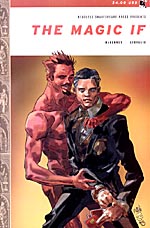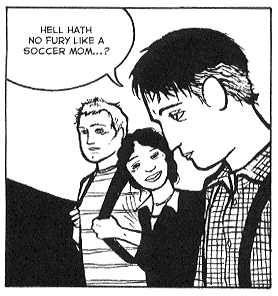 Written by Craig McKenney
Written by Craig McKenney
Art by Gervasio with Estudio Haus
48 pages, black and white
Published by Headless Shakespeare Press
It’s a little surprising that there aren’t more comic books about stage magicians. I find them fascinating, using illusion to transport people to other worlds where the impossible can happen. Aside from Jason Hall and Matt Kindt’s Mephisto and the Empty Box and Jason Lutes’s Jar of Fools, though, there’s been a real lack of stories in recent times in this particular genre. You can imagine how eager I was, then, to read Craig McKenney and Gervasio’s new comic book The Magic If.
Wynter is a stage magician who wants to make the leap to the big times; no more children’s parties, but a place where people will really appreciate his talent. It seems like he’s more interested in his one-sided rivalry with stunt magician Blaine Danvers than his assistant and lover Daniel, though. When a trick goes horribly wrong, Wynter has to figure out just what his real priorities and goals in life are.
I have to give Craig McKenney credit: after assuming I knew exactly where The Magic If was going, there were just enough little surprises to keep me interested. The story, boiled down to its absolute basics, is pretty predictable: person is unsatisfied with life, pushes everyone away from them, realizes they were wrong, discovers contentment in life. It’s those little touches, as a result, that keep you focused on the book. It’s nice that The Magic If takes place over the course of a year, realistically pointing out that these sort of spiritual journeys don’t just happen in a day or two. Likewise, the final resolution of The Magic If is certainly an upbeat one, but I appreciated that it wasn’t a simple “and everything was better” moment. There’s still a lot of hesitation and rebuilding of relationships going on here, just like in real life.
 On the whole, I liked Gervasio’s art in The Magic If. It was nice that the characters in the book are good looking without being model-attractive, and have little foibles like Daniel’s slightly shaggy hair, or the touches of gray in Wynter’s own head of hair. When Wynter hits rock bottom, the unshaven face was almost a given—but Gervasio’s other visual signs of Wynter’s mental state worked well, like the bags under his eyes or a slightly more disheveled appearance than normal. It’s just every once and a while that Gervasio’s art threw me—the unusually long legs of Daniel when he is sitting on the bed with the strategically-placed tray, or the curiously flat sequence of the dog catching the knife. They’re just small hiccups in an otherwise perfectly good display of art, though, although I do wish that Gervasio had provided the cover for The Magic If himself. (Martin Redmond’s cover is certainly eye-catching, but I found myself liking it less the more I looked at it. What the heck is going on with the impossibly long arms?)
On the whole, I liked Gervasio’s art in The Magic If. It was nice that the characters in the book are good looking without being model-attractive, and have little foibles like Daniel’s slightly shaggy hair, or the touches of gray in Wynter’s own head of hair. When Wynter hits rock bottom, the unshaven face was almost a given—but Gervasio’s other visual signs of Wynter’s mental state worked well, like the bags under his eyes or a slightly more disheveled appearance than normal. It’s just every once and a while that Gervasio’s art threw me—the unusually long legs of Daniel when he is sitting on the bed with the strategically-placed tray, or the curiously flat sequence of the dog catching the knife. They’re just small hiccups in an otherwise perfectly good display of art, though, although I do wish that Gervasio had provided the cover for The Magic If himself. (Martin Redmond’s cover is certainly eye-catching, but I found myself liking it less the more I looked at it. What the heck is going on with the impossibly long arms?)
It’s been a while since I’ve seen publisher Headless Shakespeare Press produce a new book, so this was certainly a good way to return to the medium. It’s a shame the book wasn’t square bound to provide it with a slightly longer shelf life, but hopefully The Magic If will pick up its own following before too long. Most magic may be smoke and mirrors, but when you strip away the illusions here you’re left with a solid core with real substance.
